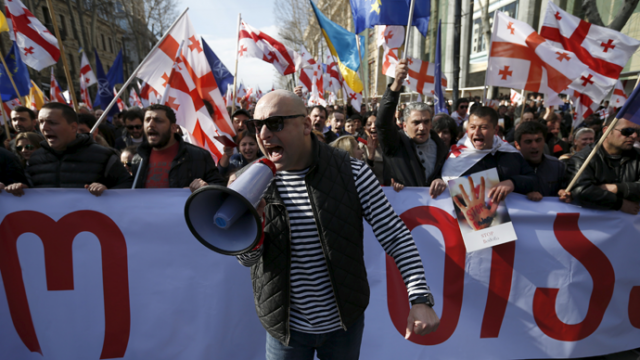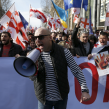
Is Georgia Headed Toward Post-Election Violence?
Publication: Eurasia Daily Monitor Volume: 13 Issue: 156
By:

Georgian Prime Minister Giorgi Kvirikashvili, who also serves as the chairman of the ruling Georgian Dream–Democratic Georgia party (GDDG), stated on September 14 that the formerly ruling United National Movement (UNM) was trying to radicalize the country’s political situation through its affiliate organizations. He asserted that UNM was setting up new groups and was planning to block the exits and entrances of polling stations to artificially create tensions. The prime minister’s statement followed Interior Minister Giorgi Mgebrishvili’s statement a day earlier, who said that, based on his information, “some political parties [intended] certain provocations during and after the elections” (Civil Georgia, September 14). Nationwide parliamentary elections are scheduled in Georgia for October 8.
UNM quickly fired back, stating that it was actually the GDDG that wanted to destabilize the situation in Georgia. Sergo Ratiani, UNM’s executive secretary, accused GDDG of raiding 60 UNM offices in the last year alone (News.on.ge, September 14).
The public’s expectations of an impending post-election civic confrontation became more real after September 27. On that day, secret audio recordings surfaced on Georgian Internet sites, in which former president Mikheil Saakashvili is allegedly urging senior UNM members to prepare for a revolutionary, violent takeover of power following the elections. He calls on them to enlist the help of opposition TV channel Rustavi 2 to exacerbate the political climate in the country. Saakashvili is also allegedly heard scolding Giga Bokeria, one of the UNM leaders, for his readiness to form a coalition with other parties were UNM to lose at the polls (Ambebi.ge, September 27). UNM has denied the authenticity of the tapes (Ipress.ge, September 27).
Earlier, on September 25, a dozen members of the UNM affiliate youth group Free Zone (Tavisupali Zona), left the organization. Beso Kaladze, one of the defectors and the leader of Free Zone’s Gldani district branch, stated that several days ago he met with Saakashvili in Odesa (where the latter is currently serving as governor). Saakashvili purportedly told him that, in case the elections do not go UNM’s way, Kaladze should prepare to organize protest rallies, block government agencies and, if necessary, be ready to stage provocations and to deal with the subsequent human casualties. Kaladze ominously called on the public not to yield to any possible provocations (Newposts.ge, Kvira.ge, September 26). UNM quickly rejected these allegations. Koba Khabazi, the founder of Free Zone, stated that the meeting between Saakashvili and Kaladze, in fact, had never taken place (1tv.ge, September 26).
Is it actually possible, or even likely, that civic confrontations or street violence may break out following the elections in Georgia? The war of words between GDDG and UNM, which accuse each other of deliberate attempts to destabilize the country, has continued for weeks (Pia.ge, September 2; For.ge, September 11). Yet, there are some signs that the situation could quickly spiral out of control, with the conflict even spilling out into the streets. For instance, back in May, pro-government thugs attacked UNM senior members in western Georgia (in the village of Kortskheli, Zugdidi district) and severely beat them up (Exclusivenews.ge, May 22). On the other hand, on September 18, several armed UNM members entered one of the campaign offices of GDDG and tried to provoke the GDDG members. UNM has denied any involvement (Timer.ge, September 19).
At the same time, UNM has been trying to create the sense of inevitability of its victory in the election, repeatedly declaring that the party would definitely win and that it was ready to defend its victory against any electoral fraud (Primetimenews.ge, Civil Georgia, September 25). Such tactics set the stage to allow the party to galvanize support if it loses at the polls, as the shock of disappointment ultimately could push UNM supporters into the streets. So far, there has not been any evidence that the government is taking any measures to commit electoral fraud. Moreover, the latest polls show that UNM’s public support stands at only 15 percent, four points behind that of the ruling GDDG (Ndi.org, June 2016). However, this number of supporters would still be enough to stage sizeable protest rallies and to generally destabilize the situation in the country in the event of a discouraging result for UNM.
Georgian Prime Minister Kvirikashvili as well as Interior Minister Mgebrishvili vowed that the government had enough resources and resolve to maintain order on the streets and keep calm and stability in the country. As the interior ministry stated, task forces will be set up in each region to address potential threats during and after the elections (Civil Georgia, September 14). Nevertheless, even an unsuccessful attempt by any political group to destabilize the situation could seriously upset Georgia’s already fragile internal peace.
As the October 8 elections approach, it is still not certain if Georgia will manage to avoid post-election turmoil. One thing is clear, however: if after the polls close the country descends into chaos, the losers will not be the political parties or its leaders, but the whole country and the people of Georgia. Instability, let alone violent confrontation, can devastate an economy already in crisis, and plunge Georgia into long-term political turmoil with far-reaching consequences. Georgia experienced a deeply destructive civil war in 1991–1993, whose ruinous economic, political, and psychological legacy is still felt in the country today. Georgian politicians, both in the government and in the opposition, must definitely draw lessons from the past to avoid dragging Georgia into another senseless cycle of conflict and destruction. The next several weeks certainly will show what is more important to the Georgian political establishment: personal ambition or their country.




